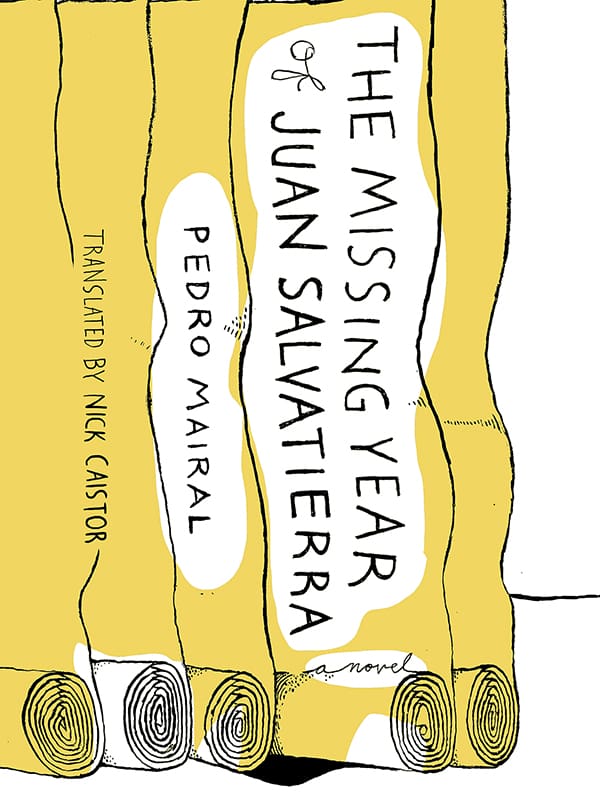
At the age of nine, Juan Salvatierra became mute following a horse riding accident. At twenty, he began secretly painting a series of long rolls of canvas in which he minutely detailed six decades of life in his village on Argentina’s river frontier with Uruguay. After the death of Salvatierra, his sons return to the village from Buenos Aires to deal with their inheritance: a shed packed with painted rolls stretching over two miles in length and depicting personal and communal history. Museum curators from Europe come calling to acquire this strange, gargantuan artwork. But an essential one of its rolls is missing. A search that illuminates the links between art and life ensues, as an intrigue of family secrets buried in the past cast their shadows on the present.
Excerpt from The Missing Year of Juan Salvatierra
Salvatierra painted every day. Each Saturday he would paint the date in blue at the bottom of the point he had reached. Some weeks he managed to paint five meters; others, it would be one, but never less than that. The amount varied according to how much detail each fragment demanded. He never stopped, because for him the canvas itself never stopped. That seemed to be his way of exorcising any painter’s block. It was as if the canvas itself was constantly unfolding to the left, in a manner over which he had no control. He never allowed himself to go back over things. If he didn’t like something he had done, he painted it again further on with variations, but he never went back. Like the past, he considered it impossible to change whatever he had painted.
Sometimes the force driving things on like a torrent is so strong that the figures start to lean, to lose their balance. There are parts of the canvas where they are painted horizontally, dragged along by the rushing current of life, as if the force of time were greater than the force of gravity.
This instability became more pronounced following my sister’s death in 1959. At first Salvatierra began to paint gloomy, lonely corners of the countryside, full of chañar and thorn bushes. These are dense episodes in which every centimeter seems to be viciously alive. In one, there’s a little girl standing motionless while a host of ants climbs her leg and a swarm of wasps surrounds her head and smothers her face. The entire space is a struggle between stinging and biting beings; they all use each other to survive and reproduce.
After that, Salvatierra began to paint my sister in a less painful way: drowned, as if she were asleep, purified by the river, an Ophelia of warm, muddy waters. In his work, Salvatierra had sought to portray the force of the river, and in return the river had demanded his twelve-year old daughter. The river was carrying her slowly but implacably away, and there was nothing he could do to prevent it. That was how he painted her: Estela drowned in the pool beneath the willows; Estela among the monster fish, her hair entangled in the reeds by the water’s edge, her heavy dress, her closed eyelids in the calm current; Estela barely visible beneath the surface, floating through the clouds of reflected water.
This is where everything begins to be flattened by the gusting wind of time. People are suddenly horizontal, swept along by the invisible current. The tree branches flail about, the animals, rain, everything slants to one side, unable to resist. Further on still, they start to appear upside down, to turn tail, until at a moment of complete loss of balance when I think my father must have been close to going mad, the universe tips over completely, the landscape does a somersault, the sky is at the bottom and the land at the top, as though my father were once again seeing the world with the fear of dangling from the stirrup of a horse galloping out of control among the trees.
***
Jordán’s house had no bell, so I clapped my hands. A curious yellow puppy came out, then the black dog from the previous day appeared. The house was at the back of a small lot; it was a square building with two rooms and a bare cement front. Next to it stood a trellis vine that gave shade. I was about to leave again when I heard a sneeze. Jordán was inside, but he hadn’t heard me. I called out to him. Still no reply. I opened the gate and went in. The dog growled and pranced about, but I tried to walk on without looking down at it. When I got close to the house it gripped my trouser leg. I started shouting “Get off me!” but it wouldn’t let go. Then Jordán appeared, his hair tousled. He shooed the dog out of the way, and peered at me in astonishment.
“I’m Salvatierra, do you remember me?”
“Aha.”
“Forgive me for entering like this, but I was clapping my hands and …”
“Come on in,” he said.
We went into one of the rooms, which turned out to be a kitchen. It had no light, only a table and a few chairs. On the wall there was a small, round mirror and a calendar with photos of rodeo riders demonstrating their skills. I sat down and Jordán put some water on for mate tea. I noticed his right hand was bandaged. He sat in the far corner of the room while the water boiled.
“Don’t you practice on the accordion anymore?”
“No,” he replied, bending to reach for something behind him. “Now I practice on my shotgun.”
He was pointing a double-barreled shotgun at me. I was once robbed in a Buenos Aires taxi, and they pointed a revolver at me, but I never saw it because it was pressed into my ribs. The guy must have been a cop, because he had short hair and was very calm. This was different. A crazy old man whose hands trembled was pointing a gun meant for blasting capybara straight at my face.
I started to rise to my feet, warning him to be careful.
“Sit down or I’ll blow your head off,” he said.
I sat down and he stared at me.
“So, Salvatierra … Still after the same old thing, are you?”
“After what?” I asked.
“That little painting of yours.”
“Yes, but why don’t you put that gun down, Jordán? We can talk about it peacefully, there’s no need to threaten me.”
“You owe me.”
“Owe you?”
“You’re nothing but a henpecked asshole.”
“I don’t know what you’re talking about. Is that shotgun loaded?”
“Orbea 16 mm cartridges. Two shots. One to make you suffer, the other to finish you off.”
“Stay calm, boss. I’m going to leave now. Tomorrow without fail I’ll bring what you say I owe you. Agreed?”
“Agreed, nothing,” he replied angrily.
I fell silent and didn’t move. The water was already boiling. Jordán’s finger was on the trigger. He was pointing it at my head, but the weight of the gun-barrel meant it kept dropping towards my stomach. Every so often, he jerked it up again.
“You’re a liar as well as a traitor. The guy who couldn’t speak is not so dumb after all.”
“I’m not Juan Salvatierra, Jordán. I’m Miguel, his son.”
“And I’m General Perón. You owe me half a load of white horse that was stored in the shed.”
“What white horse?” I said.
“Don’t play the fool, Juan. You want your painting, I want my white horse.”
“Have you got the painting?”
“No, but I know who has. Bring me my whiskey and then we’ll see.”
“How much whiskey?”
“The forty cases you owe me.”
“OK, I’ll bring them tomorrow,” I said, rising from my seat once more.
“Stay where you are.”
I sat down again.
“Do you know why I feel like killing you? How long have we known each other, Juan?”
“How long?” I asked.
“Since we were this tall. We were like brothers. The whole day together in the river. We were partners. Then you wanted to split up. I accepted that, didn’t I?”
He paused for me to answer, but I said nothing.
“Did you know that Ibáñez and Vázquez wanted to kill you?”
“No.”
“I made them swear they’d leave you alone. But when you shut the shed on me … that really made me mad, che. I don’t know how I ever forgave you for that.”
The old man fell silent, looked me in the eye, and then said:
“So you owe much more than any little white horse, Juan. You owe me your life.”
I didn’t say a word. There was the sound of shuffling feet in the corridor. It was Jordán’s granddaughter.
“Messing about with that shotgun again, granddad!” she said, and snatched it from him as if she were taking a toy from a child. She glanced at me, lifted the kettle from the stove, and said:
“Did he scare you with the gun? Don’t worry,” she whispered. “My brother filed down the hammer. Let me see you hand, granddad,” she said out loud, and began to check his bandage. “You’ve been playing with it, haven’t you? You have to leave the bandage alone. And be careful with that kettle. The handle is loose, mind you don’t go burning yourself again.”
“I’ll be leaving now. ’Bye,” I said, rushing for the door.
The dog snapped at me on the way out, but by now, after being so scared I was going to die, I felt almost friendly towards it.
